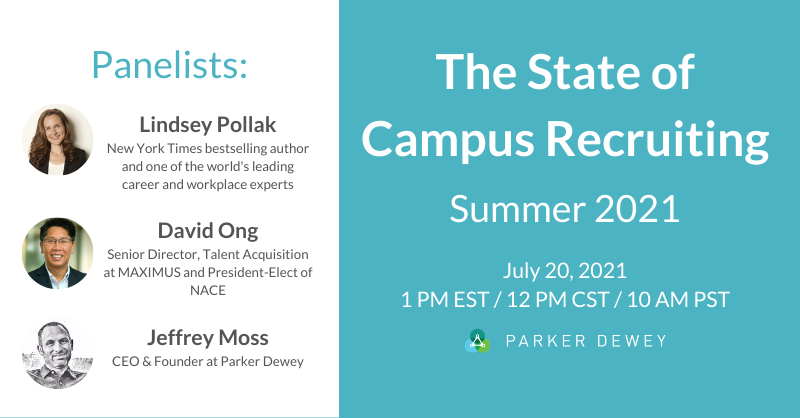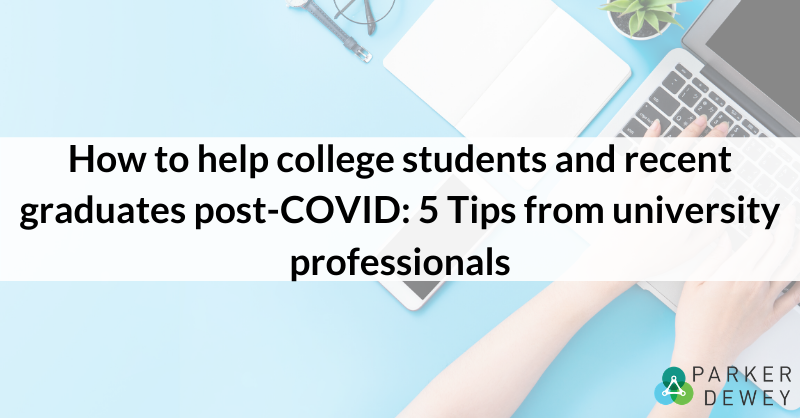.png)
Why It's Time to Ditch "Static and Monolithic" Hiring Assessments
We’re “drowning in a ‘skills canyon,’” writes Japman Bajaj in this week’s first featured article.
The primary reason: companies continue to rely on “static and monolithic” models of assessing candidates that don’t properly shed light on how a candidate will perform on the job. Standardized testing. Academic pedigree. GPA. Signals that say little about a candidate’s core skills like critical thinking, problem solving, or communication abilities. Not only do they not predict a good hire, these indicators inherently exclude candidates from underrepresented backgrounds and “[reinforce] major race, gender, language and ableist discrimination patterns that our global, national and regional economies simply can’t afford to have.”
This is why we advocate so strongly for Experiential Recruiting practices like Micro-Internships that level the playing field by providing college students from all backgrounds opportunities to showcase their skills, and do so in a way that improves hiring outcomes for organizations.
And as early-career experts Lindsey Pollak and David Ong will discuss during today's quarterly The State of Campus Recruiting webinar, the past 18 months have created a unique situation to address this. While some companies found challenges with campus recruiting, new best practices emerged that helped college students cross the “skills canyon” and organizations improve hiring, diversity, and conversion outcomes in their campus recruiting efforts.
Jeffrey Moss, Founder and CEO
Today's Webinar

Join today us for our summer edition of The State of Campus Recruiting! We'll continue on our recent theme of "reinventing university recruiting," and discuss what emerging talent is looking for after a year+ of disruption, how companies are responding to the call for more remote opportunities, and employer branding to attract talent across generations.
Articles of the Week
Traditional skills assessment earns a failing grade - World Economic Forum
Do Your DE&I Efforts Consider Age, Class, and Lived Experience? - Harvard Business Review
What Do We Mean by Educational Innovation? - Inside Higher Ed
Traditional skills assessment earns a failing grade - World Economic Forum
“Despite substantial evidence that people learn in different ways, we have continued to assess competency in the same traditional way. We have created dynamic, blended-learning opportunities, but have not done the same for assessment. Combining blended learning with static assessment has proven unsuccessful, and instead created barriers and stunted accomplishments.”
Companies too often rely on outdated assessments and other signals that prove far from accurate and actually reinforce discrimination patterns in early-career recruiting. This article looks at the “skills canyon” across different areas of the economy, and highlights that the most effective way to evaluate the skills of a prospective candidate is through hands-on, real-life work experiences like Micro-Internships.
Related reading: How Micro-Internships Bridge the Core Skills Gap
Do Your DE&I Efforts Consider Age, Class, and Lived Experience? - Harvard Business Review
“When companies collectively decide to broaden the perspectives on what diversity can mean, it’s easier to understand how different experiences can be considered as an important counterpart to ‘traditional’ — or university or work-earned — knowledge.”
Both the definition of diversity and the traditional strategies intended to create space for historically excluded groups are in “the midst of a seismic shift.” While experiences gained in university are invaluable, a broadened perspective on diversity should also consider age, socioeconomic status, and lived experience in addition to the more traditional markers. In this article, author Noa Gafni describes strategies for hiring and retaining workers through the lens of each of these areas.
Related reading: Diversity Recruiting
What Do We Mean by Educational Innovation? - Inside Higher Ed
“My overarching goals are to bring more undergraduates to success in high-demand fields; scale the high-impact practices that result in deeper learning, personal growth and critical self-reflection; and give many more undergraduates access to the kinds of rich educational experiences that only the most privileged students currently receive.”
We hear “innovation” tossed around every which way—but what does it really mean in the context of education? Professor Steven Mintz posits that it’s about “redesigning policies and practices” to emphasize core skill building and personal growth. He goes on to suggest five strategies for getting started, including “embed career preparation...into the academic experience,” an idea that connects directly with Micro-Internships! (Check out our recent interview with a Micro-Intern for insight on how she put skills learned in the classroom to use during her Micro-Internship.)
Related reading: Student Success: Lily’s Micro-Internships
For more stories and insights on HR, recruiting, and diversity, click here to subscribe to our weekly newsletter Hire Learnings.





.png)